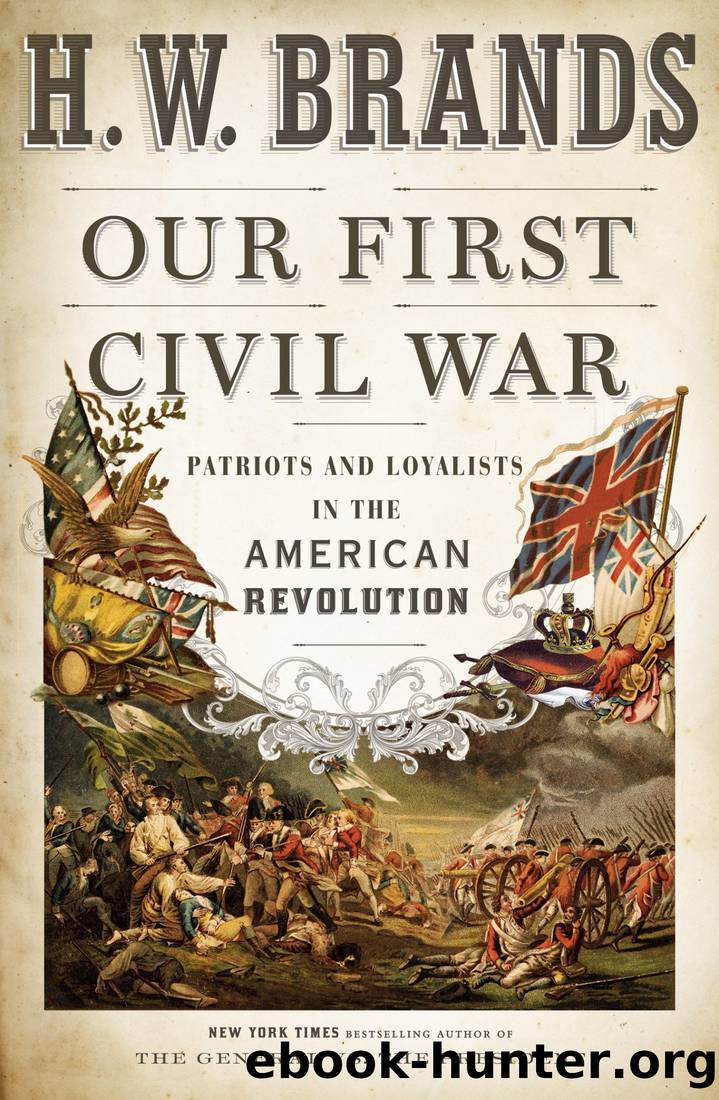Our First Civil War by H. W. Brands

Author:H. W. Brands [Brands, H. W.]
Language: eng
Format: epub
Published: 2021-11-09T00:00:00+00:00
* * *
â
Before long, Temple wouldnât have been able to visit his father even if he wanted to. Watchers of William reported that he had violated the terms of his parole. Governor Trumbull received the news from George Washington, who had it from William Livingston, Williamâs successor as governor of New Jersey. âGovernor Livingston informed me a few days ago that he understood that Governor Franklin, by some means or other, continued to carry on a correspondence with Mr. Hugh Wallace of New York,â Washington told Trumbull. âAnd a gentleman of the name of Livingston who went into New York and took protection, but not liking his situation, returned again, informed upon oath, that he heard that Governor Franklin granted protections to such as would take them.â The protections were letters signed by William Franklin authorizing safe passage through British lines. Washington conceded that he was relating hearsay. âI donât know that the foregoing amounts to positive proof against Governor Franklin,â he told Trumbull. âBut it ought, at least, to put you upon your guard, and have him narrowly watched.â
Washington apparently received additional evidence of Williamâs misbehavior, for a month later he wrote again to Trumbull to say, âMr. Franklinâs conduct is truly reprehensible, and I am amazed that men under such engagements should not be more regardful of the ties of honor.â
The Continental Congress agreed that the deposed governor had acted reprehensibly. It sent Trumbull an order mandating that William Franklin be closely confined, forbidden communication with others, and denied access to paper and pen.
Perhaps relieved to have the decision taken out of his hands, Trumbull directed that William Franklin be taken to Litchfield, thirty miles west of Hartford, and held there, alone, in a cell above a tavern. He was allowed no visitors and no time outside the cell, which was infested with fleas, rats and other vermin. His food was meager and scarcely palatable; the noise from the tavern kept him awake. But worst was the solitary nature of his confinement. âI suffer so much from being thus buried alive, having no one to speak to day or night, and for the want of air and exercise, that I should deem it a favor to be immediately taken out and shot,â he wrote to Trumbull.
Elizabeth Franklin suffered, too. After her husband was carted off to Connecticut, she fled Patriot-controlled New Jersey for British-occupied and Loyalist-dominated New York City. She had no money, their property having been confiscated, and had no friends in New York. In poverty and solitude she soon fell ill. William heard of her distress and wrote to George Washington requesting a furlough to see her. He acknowledged that the Continental Congress had ordered his imprisonment and that Washington might feel a need to defer, but he appealed to Washingtonâs humanity. âAll I request is to be allowed to visit my poor dying wife, and to endeavour to recover her, or, if that should not be possible, to at least contribute all in my power to comfort her in her last moments,â he said.
Download
This site does not store any files on its server. We only index and link to content provided by other sites. Please contact the content providers to delete copyright contents if any and email us, we'll remove relevant links or contents immediately.
Harry Potter and the Goblet Of Fire by J.K. Rowling(3046)
Unfinished: A Memoir by Priyanka Chopra Jonas(2918)
Never by Ken Follett(2884)
The Man Who Died Twice by Richard Osman(2300)
Machine Learning at Scale with H2O by Gregory Keys | David Whiting(2293)
Fairy Tale by Stephen King(2071)
Will by Will Smith(2043)
Rationality by Steven Pinker(1765)
The Storyteller by Dave Grohl(1662)
The Dawn of Everything: A New History of Humanity by David Graeber & David Wengrow(1571)
The Dark Hours by Michael Connelly(1571)
The Stranger in the Lifeboat by Mitch Albom(1532)
Cloud Cuckoo Land by Anthony Doerr(1435)
The Becoming by Nora Roberts(1331)
Friends, Lovers, and the Big Terrible Thing by Matthew Perry(1330)
New Morning Mercies: A Daily Gospel Devotional by Paul David Tripp(1325)
Crying in H Mart by Michelle Zauner(1316)
Einstein: His Life and Universe by Walter Isaacson(1315)
A Short History of War by Jeremy Black(1300)
